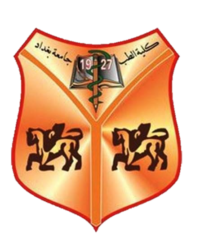Admission Inputs
Students are admitted to the College of Medicine from graduates of the scientific branch of secondary school only, and from graduates of the current year, according to the central admission system and in accordance with the regulations and instructions set by the Ministry of Higher Education and Scientific Research. Admission is also subject to the specific GPA requirements for each academic year.
Learning Outcomes
The goal is to graduate highly competent physicians equipped with knowledge, skills, and professional behavior that qualifies them for safe lifelong practice, serving the community, and conducting scientific research based on the competencies they have acquired, thus establishing a foundation for continuing their professional lives and achieving the college's goals.
Learning outcomes are divided into four categories:
A - Cognitive Objectives:
- Applying scientific principles of medicine and understanding basic sciences as integrated disciplines in a body-system-based model that serves clinical practice.
- Full understanding of communication skills with patients, their relatives, and professional colleagues.
- Full knowledge of professional conduct and medical ethics.
- Awareness of primary healthcare programs and preventive measures.
- Familiarity with scientific methods for conducting medical research.
B - Program-Specific Skill Objectives:
- Recording medical history and conducting physical examinations of the body's systems.
- Acquiring essential knowledge of laboratory and radiological tests, as well as the procedures required to obtain necessary samples.
- Effectively working as part of an emergency care team, performing first aid, basic life support, and life-saving measures.
- Acquiring technical skills in using computers, collecting, and interpreting electronic information related to patient care, health promotion, scientific research, and education.
C - Affective and Value-Based Objectives:
- Working harmoniously within a team.
- Empathy and sensitivity toward patients.
- Ensuring equality among patients regardless of gender, race, or beliefs.
D - General and Transferable Competencies (Other employability and personal development skills):
- Knowledge of medical profession laws.
- Issuing death certificates.
- Preparing police reports.
- Computer skills.
Career Opportunities for Graduates
Graduates can work in healthcare institutions, hospitals, and educational institutions.
Employers of Graduates in the Field
- Ministry of Health and its institutions.
- Ministry of Higher Education in its educational institutions, universities, and medical institutes.
Duration of Study
Six years.
Degree Awarded
Bachelor's degree in Medicine and Surgery – College of Medicine – University of Baghdad.
Academic Background Required for Admission
A secondary school diploma in biology or science.

